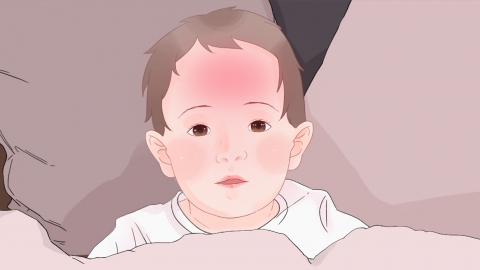Why does a child develop a fever as soon as they fall asleep, and what should be done?
Generally speaking, the main reasons why children develop fever shortly after falling asleep include reduced heat dissipation during sleep, nighttime hormonal secretion changes, upper respiratory tract infections, roseola infantum, and acute tonsillitis. Parents can choose medications such as acetaminophen suspension drops, ibuprofen granules, or pediatric paracetamol chlorpheniramine maleate granules according to the specific situation to alleviate symptoms. Detailed explanations are as follows:
1. Reduced heat dissipation during sleep
When children sleep, they are often in a closed environment, covered with thick blankets or wearing excessive clothing, which prevents the body from effectively releasing heat, leading to a mild increase in body temperature. Parents can appropriately reduce the child's clothing during sleep, choose breathable and lightweight bedding, keep the bedroom well-ventilated, and maintain the indoor temperature between 22-24°C to help dissipate body heat and prevent continuous temperature elevation.

2. Nighttime hormonal secretion changes
At night, the secretion of hormones such as glucocorticoids, which have a fever-reducing effect, decreases in children's bodies. The body's ability to fight inflammation and regulate body temperature declines, making temperature fluctuations or fever more likely. No special medication is needed in such cases. Parents should observe the child's mental state, avoid vigorous activity before bedtime, and ensure a quiet and comfortable sleep environment to help maintain a stable physiological state.
3. Upper respiratory tract infection
Most commonly caused by viral infections, at night children's immunity is relatively lower, and viral replication becomes active, triggering an inflammatory response in the body and resulting in fever, often accompanied by symptoms such as nasal congestion and runny nose. If the body temperature exceeds 38.5°C, antipyretics such as acetaminophen suspension drops or ibuprofen granules can be administered under a doctor's guidance. If nasal congestion is evident, pediatric paracetamol chlorpheniramine maleate granules may be used as prescribed to relieve symptoms. Encourage the child to drink plenty of warm water and ensure adequate rest.
4. Roseola infantum
Caused by human herpesvirus 6 infection, during the early stage of the disease, children often experience fever at night, with temperatures reaching above 39°C, followed by a rash after the fever subsides. During the fever, body temperature can be controlled with medications such as acetaminophen suspension drops or ibuprofen granules under a doctor's guidance to prevent febrile seizures. Keep the child's skin clean during this period, and provide light and easily digestible food such as millet porridge and vegetable puree to aid recovery.
Inflammation of the tonsils caused by bacterial or viral infection can worsen at night due to inflammatory stimulation, leading to fever in children, which may be accompanied by sore throat and difficulty swallowing. If bacterial infection is confirmed, antibiotic treatment such as amoxicillin-clavulanate potassium granules can be administered under a doctor's guidance. Fever can be managed with acetaminophen suspension drops, and warm saltwater gargling can help alleviate tonsillar swelling and pain. Avoid feeding the child spicy or irritating foods.
In daily life, parents should adjust the child's clothing promptly according to temperature changes to avoid overheating or getting chilled during sleep; ensure a balanced diet rich in fruits and vegetables containing vitamins to enhance immunity; closely monitor the child's temperature when fever occurs, and seek timely medical attention if high fever persists or the child appears lethargic, to identify the underlying cause and receive appropriate treatment.




